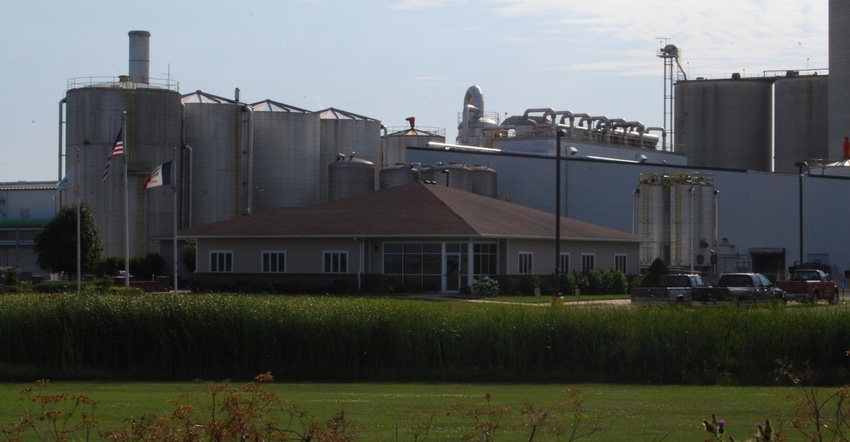October 9, 2019

The White House last week announced a fix for the Renewable Fuel Standard controversy. Details are still to be announced as reaction continues to flow in from Iowa farmers and biofuel producers. The package announced Oct. 4 by the Trump administration is intended to address the damage caused by the U.S. Environmental Protection Agency granting refinery exemptions that have destroyed biofuel demand and led to shuttered ethanol and biodiesel plants across the country.
The proposal includes a much-needed reallocation of exempted gallons in order to ensure the integrity of the RFS blend levels. The Trump administration says it will make sure at least 15 billion gallons of ethanol per year are blended into the nation’s gasoline supply by reallocating gallons lost due to waivers EPA has given to small petroleum refineries. Over the past three years, EPA has granted waivers to the RFS-required volumes, which has enabled the oil industry to avoid blending 4 billion gallons of ethanol and biodiesel into the nation’s fuel supply.
The deal announced last week by EPA Administrator Andrew Wheeler had been rumored to be in the works after Iowa’s two Republican U.S. senators — Chuck Grassley and Joni Ernst — along with Gov. Kim Reynolds and biofuel industry representatives met with President Donald Trump in September to offer a unified approach to address the increasing concern about the waivers.
Countering the concern expressed by farmers and biofuel producers, oil industry groups met with Trump urging him to continue the waivers.
Details of Trump plan still coming
While last week’s announcement was widely welcomed by biofuel backers, it lacks details, and it is unclear if the president’s plan will be enough to immediately boost the market and help the nation’s ailing ethanol and biodiesel plants.
“The market will respond positively. But I don’t know if it will be immediate enough to restart the plants that have been shut down,” says Monte Shaw, executive director of the Iowa Renewable Fuels Association. “And it might not immediately prevent additional plants from shutting down.”
There’s been a lot of demand destruction for biofuels the past three years as EPA has been handing out refinery waivers, and you don’t fix that overnight. At least 29 ethanol and biodiesel plants nationally have been idled, either temporarily or permanently. In Iowa, two ethanol plants and a biodiesel plant have shut down in the last two months. Others have cut back production as a result of reduced demand for ethanol and biodiesel due to refinery waivers.
Shaw adds, “Iowans thank President Trump for listening to their concerns and our calls for the RFS to be enforced according to the law. The economic devastation wrought by the unjustified use of refinery exemptions must be stopped. We welcome the proposal to restore integrity to the RFS by accounting for those exemptions using a three-year rolling average of the actual refinery exemptions granted.
“We will work with the White House to make sure EPA’s final rules ensure that a 15 billion-gallon RFS, will indeed actually be a 15 billion-gallon RFS. If that is accomplished, the integrity of the RFS will be restored, and President Trump’s promise to protect and uphold the RFS will be redeemed.”
Rulemaking and public comments
Much of EPA’s plan must still be adopted through a formal rulemaking process. EPA is set to propose major parts of the plan as soon as next week. Wheeler says his agency will finalize the changes by Nov. 30, the legal deadline for EPA to set the annual RFS volume obligations for the coming year.
In the Oct. 4 announcement, Wheeler said EPA plans to begin adding back the waived gallons of ethanol and biodiesel next year to the RFS. The remaining oil refiners will be picking up the waived gallons. EPA is expected to calculate how much demand is lost through the waivers. The proposed rule outlining the administration’s plan will be submitted as a supplement to the 2020 RFS biofuels mandate. A public comment period will be announced.
The petroleum industry is expected to challenge EPA’s plan in court. Oil refiners are questioning the legality of EPA’s new quota-setting plan. “We can’t ignore the fact that the oil industry will likely file a lawsuit,” Shaw says. “Also, we need to keep in mind this new EPA proposal is the start of the formal rulemaking process, not the end of it. We have to make sure EPA follows through on what the president is proposing.”
ICGA thanks administration
The Iowa Corn Growers Association received last week’s announcement from the Trump administration as positive news. “The momentum is in the right direction to uphold the integrity of the RFS,” says ICGA President Jim Greif, an eastern Iowa farmer.
 NEW RULES: “While EPA’s announcement that it will restore the integrity of the RFS is great news, it’s not the final step. We will continue to work to see that these plans are carried out,” says ICGA President Jim Greif.
NEW RULES: “While EPA’s announcement that it will restore the integrity of the RFS is great news, it’s not the final step. We will continue to work to see that these plans are carried out,” says ICGA President Jim Greif.

ICGA released a statement thanking Trump for his commitment to address the demand destruction of corn ethanol brought on by expanded use of the small refinery exemptions. ICGA will push for EPA to account for those exemptions using the three-year rolling average of actual waived gallons, beginning with the 2020 RFS volumes.
“This gives hope to Iowa’s rural economy, especially at a time when corn farmers need it most,” Greif says.
Wheeler and USDA Secretary Sonny Perdue say the Trump administration is also looking at other additional actions to boost biofuel use. EPA will continue to evaluate options for RIN (Renewable Identification Number) market transparency and reform.
Meanwhile, USDA will seek opportunities through the budget process to provide cost-share funding to get more retail fuel stations to install E15 pumps and tanks, and other infrastructure to handle E15 and higher blends of ethanol fuel.
Also, Perdue says the Trump administration will continue to work to address trade issues that affect U.S. ethanol and biodiesel exports.
Industry reaction
The Iowa Biodiesel Board joined other renewable fuel advocates in thanking Trump for directing EPA to properly account for future small refinery exemptions in the annual RFS rules.
Grant Kimberley, IBB executive director and director of market development for the Iowa Soybean Association, said: “We thank the president for listening to rural America and the biofuels industry in addressing the small refinery exemptions in the Renewable Fuel Standard. It’s a significant move toward restoring the integrity of the program. Facing a fragile farm economy and with at least one Iowa biodiesel plant having closed its doors, the announcement last week by the White House is welcome relief. We urge EPA to act swiftly and earnestly in carrying out this plan.”
Iowa is the nation’s ethanol and biodiesel leader, producing 4.3 billion gallons of ethanol and 365 million gallons of biodiesel annually. The biofuel industry supports 48,000 jobs in Iowa.
You May Also Like




